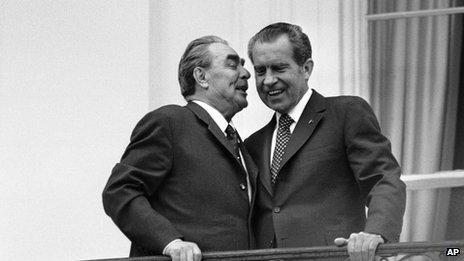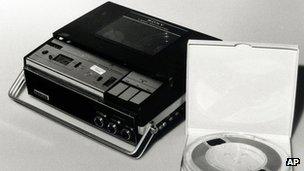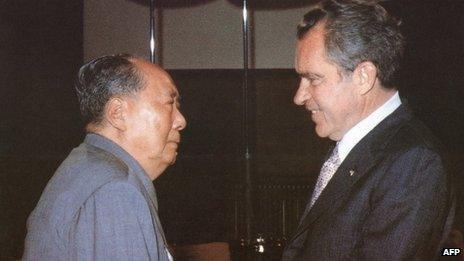Tapes show Richard Nixon as Watergate scandal loomed
- Published

Soviet leader Leonid Brezhnev's conversation with Nixon was one of the few summit talks recorded
Two future US presidents called Richard Nixon in support after he gave a speech on the Watergate scandal amid a staff exodus, newly released tapes show.
Ronald Reagan and George H W Bush attempted to boost Nixon as he denied any knowledge of the infamous break-in at his political rivals' offices.
The calls are among the final instalment of recordings to be released from the Republican's administration.
Nixon, who quit in 1974, remains the only US president to have resigned.
His second term was engulfed by scandal after burglars tied to his re-election committee in 1972 broke into the Democratic party's headquarters at the Watergate office complex in Washington DC, in an attempt to dig up dirt on his political adversaries.
The recordings, external are the last of a total of 3,000 hours of tape released by the National Archives and Records Administration.
Another 700 hours remain restricted by national security and privacy concerns, but the archive says they will now be reviewed in order to see what can be released.
'Great pride'
The tapes cover the time period between 9 April and 12 July 1973, the day before the existence of Nixon's secret recording system in his offices was made public to a Senate panel probing the Watergate scandal.
The tapes implicated him in a cover-up about the break-in.

The original White House recorder is also kept by the National Archives
The calls from the future presidents came on 30 April, after Nixon had made a public address about the growing scandal.
Earlier that day, three senior White House officials had resigned over the affair and another was sacked.
Reagan, who was governor of California at the time, told Nixon the speech had been the right one to make.
"You can count on us," he said. "We're still behind you out here and I wanted you to know that you're in our prayers."
Mr Bush called the same evening. The newly appointed chairman of the Republican National Committee said he had watched the speech with "great pride".
'Change the world'
Nixon complained to Mr Bush about the reaction from broadcasters.
"The folks may understand," Nixon said, adding: "To hell with the commentators."

Nixon (here with Mao Zedong) described the Chinese as the "ablest people in the world"
The tapes also include Nixon press secretary Ron Zeigler briefing the 37th president about the possibility of further serious revelations by the Washington Post reporter Bob Woodward.
Despite the crisis engulfing him, Nixon remained actively engaged in global diplomacy.
At one point - in discussions with an aide - Nixon can be heard describing the Chinese as "the ablest people in the world".
The president can also be heard holding a lengthy Oval Office conversation with Soviet leader Leonid Brezhnev before a June 1973 summit.
Nixon expresses a close interest in ties with China - a relationship he describes as the "key to world peace".
In the hour-long one-on-one, assisted by an interpreter, the two leaders chatted about personal topics, including their families.
"We must recognise.... while we will naturally in negotiations have some differences, it is essential that those two nations, where possible, work together," Nixon said to Brezhnev.
"If we decide to work together, we can change the world," he said. "That's my attitude as we enter these talks.''
Previous releases show the president as a paranoid man who was obsessed with the Kennedy family.
He considered Senator Ted Kennedy such a political threat that he ordered surveillance in the hope of catching him in an affair.
- Published22 March 2013
- Published29 October 2012
- Published17 June 2012
- Published19 June 2012
- Published3 November 2012